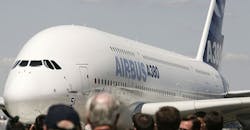EU Failed to Stop Illegal Airbus Subsidies Says WTO
In a major victory for the U.S. and Boeing, the World Trade Organization said on May 15 that the EU failed to remove its illegal subsidies for Airbus.
The decision by the appellate division of the WTO's Dispute Settlement Body is not subject to appeal and clears the way for the U.S. to seek billions of dollars in retaliatory tariffs against European exports.
The decision marks a milestone in a case that has dragged on for more than a decade.
Boeing said the victory secured on its behalf by the U.S. trade office could see the EU slapped with "the largest-ever WTO authorization of retaliatory tariffs".
In a statement, the Chicago-based firm said those tariffs could amount to $22 billion, equivalent to the amount in illegal subsidies that Airbus has received from the EU, according to Boeing's tally.
"Today's final ruling sends a clear message: disregard for the rules and illegal subsidies are not tolerated," Boeing said.
The office of the United States Trade Representative (USTR), which represents Washington at the WTO, called the decision "an important victory" for President Donald Trump's administration.
Counter Claims
But, as always in the epic legal battle between the aviation industry's two main powerhouses, the situation is not quite so clear-cut.
First, the US must ask the WTO to approve specific retaliations against EU products. Brussels will be able to challenge that decision.
The EU also sought to portray itself as a victor of sorts following Tuesday's ruling -- another standard move in the Airbus-Boeing legal showdown.
EU Trade Commissioner Cecilia Malmstrom pointed out that the ruling dismissed several US claims regarding the damage suffered by Boeing, noting this could impact the level of retaliation approved by the WTO.
But Malmstrom conceded that the ruling had put the onus on the bloc to change its practices in regards to Airbus.
"The EU will now take swift action to bring itself into line with WTO rules as regards its remaining obligations," she said.
The original dispute dates to 2004, when the U.S. argued that the support offered to Airbus by the EU as well as the governments of Britain, France, Germany and Spain breached WTO rules.
In 2011, the WTO ordered Brussels and those countries to withdraw certain support and subsidy programmes.
The EU appealed against that decision in 2016 but was handed a definitive defeat on May 15.
What's Next?
Beyond wrangling over the level of retaliation, Brussels also noted that it was looking forward to a WTO decision in its own case against the U.S. and Boeing.
Malmstrom claimed public financial support for Boeing in the US is "massive and persistent."
Brussels has won a series of victories as its case has worked its way through the WTO's protracted dispute system.
Trump's posture towards the 164-member WTO also overshadows the latest legal developments.
The USTR, in its latest trade guidance to Congress, has suggested that Washington has the right to ignore any WTO rulings that violate American interests.
The U.S. has also blocked the appointment of new judges to the DSB's appellate division, a strategy that could effectively force the WTO court to shut down by the end of next year.
Yet, even as Trump's administration has leveled a range of attacks against the WTO court, it has continued to file cases, including against China over alleged intellectual property theft.
"President Trump has been clear that we will use every available tool to ensure free and fair trade benefits American workers," Ambassador Robert Lighthizer, who heads Trump's trade office, said.
By Ben Simon
Copyright Agence France-Presse, 2018
About the Author
Agence France-Presse
Copyright Agence France-Presse, 2002-2025. AFP text, photos, graphics and logos shall not be reproduced, published, broadcast, rewritten for broadcast or publication or redistributed directly or indirectly in any medium. AFP shall not be held liable for any delays, inaccuracies, errors or omissions in any AFP content, or for any actions taken in consequence.
